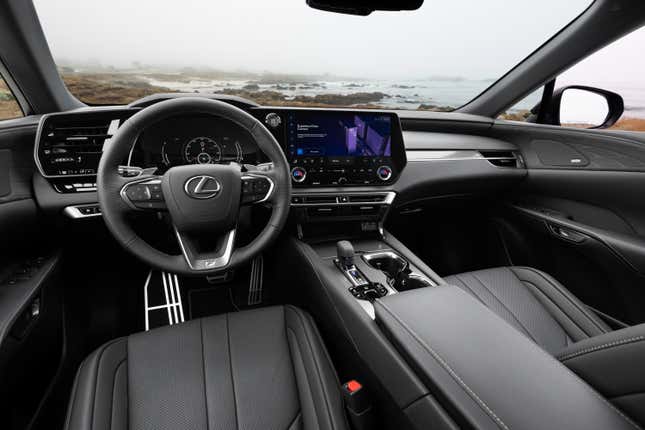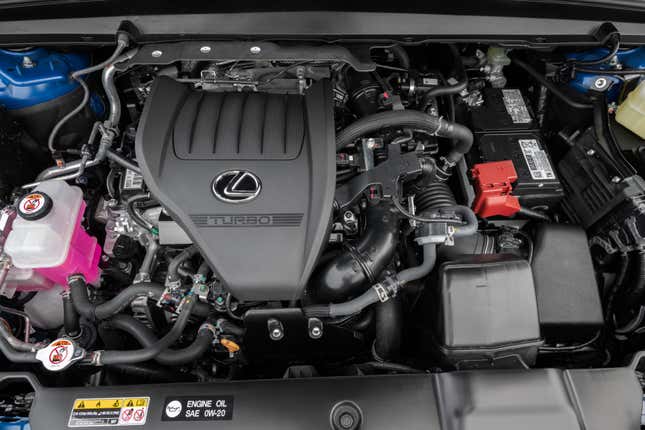Car enthusiasts always crap on the Lexus RX for being a boring car, and they’re not entirely wrong. The RX is steadfastly conventional by design, arguably making it better at its job. See, when Lexus comes up with a new RX, the automaker is largely considering the opinions and tastes of people who already own an RX — a group that will make up approximately 33 percent of the new model’s sales.
That’s why the RX rarely sees huge changes in performance, technology or styling. Lexus is always careful to make incremental, intuitive improvements to its bread-and-butter SUV. That’s also why the 2023 RX is such a big deal: It’s built on a completely different platform, which makes for some of the biggest (on paper) changes in the model’s history. That got us curious enough to attend the launch of the new RX near Santa Barbara, CA.
Full disclosure: Lexus wanted me to drive the new RX so badly, the company paid for my hotel and meals for two nights in Santa Barbara. I drove up in my 52-year-old Mercedes with no air conditioning, narrowly avoiding heat exhaustion on the way.
The 2023 Lexus RX will be available at launch in a handful of flavors. There is the base non-hybrid RX 350, the hybrid RX 350h and the top-tier RX 500h. These all ride on the same GA-K platform shared with the Lexus NX, which means the NX’s excellent infotainment system (excellent compared to previous versions, anyway) makes its way into the RX. But so do the NX’s electronic door latches, which Lexus calls “Digital Latch with Safe Exit Assist.” Those aren’t so good, but more on that stuff later.

The base non-hybrid RX offers 275 hp and 317 lb-ft of torque from a turbocharged 2.4-liter four-cylinder engine, paired with an eight-speed automatic transmission and either front or all-wheel drive. The RX 350h uses an Atkinson-cycle 2.4-liter naturally aspirated four-cylinder engine and a hybrid-electric motor producing a total system output of 246 hp and 233 lb-ft and paired with a CVT and an electric motor on the rear axle. Hybrid RX models are all-wheel drive only.
Finally, the flagship RX 500h uses the turbocharged engine from the base model, but adds an electric motor to the rear axle. This bumps total system power to a healthy 366 hp and 406 lb-ft. Interestingly, the 500h is paired with a six-speed automatic transmission. I asked Lexus representatives why the 500h makes do with two fewer forward gears than the base model, but they didn’t have an answer for me.
As you might expect, with so many hybrids on offer, the RX is pretty focused on fuel economy, and the numbers here aren’t exactly disappointing. The base model promises 22 mpg city, 29 highway, 25 combined in front-drive form. Knock off 1 mpg across the board when you add all-wheel drive. The 350h does much better with 37 mpg city, 34 highway, 36 combined. The 500h isn’t bad either at 27 city, 28 highway, 27 combined.
As you might expect, none of these powertrains are going to light your hair on fire with their performance. They’re all perfectly fine. The 500h is obviously the most enjoyable with the extra power boost, but it also benefits from electronic adaptive suspension and, critically, four-wheel steering. It’s the only model out of the three to offer these features, and they do make a difference. It’s also worth mentioning that the 500h is only available as an F Sport model.

Overall, ride comfort across the trim levels is high, which isn’t surprising. The RX is a luxury SUV first and foremost, and people buy them because they’re nice to ride in. The steering is direct but lacks any feedback. The brakes are fine — don’t expect sports car performance and you won’t be disappointed. These might sound like points against the RX, but they really aren’t. A large part of what makes the RX good is a clear-cut definition of its role as a vehicle.
Exterior styling, while subjective, has been improved over the outgoing generation. Lexus calls the new, updated styling language “Spindle Body,” which sounds worse than it is. The Lexus corporate predator grille has been toned down significantly (thank goodness), and the rest of the body isn’t terribly overstyled — apart from the floating roof, which Lexus says its RX buyers love, even if we don’t.
Inside, things are typical Lexus. Even in the base model, the materials are nice, and everything feels extremely well put-together. The optional 14-inch infotainment screen is big, bright and responsive. The smaller 9.8-inch base-model screen is no penalty. Wireless Android Auto and wireless Apple CarPlay are standard.
My favorite part of any Lexus product is the Mark Levinson stereo system. For 2023, the Levinson setup in the RX gets upgraded to 21 speakers, and the difference is noticeable. The stereo is one of the best you can get in a sub-$100,000 vehicle, and anyone who buys a Lexus without the Levinson upgrade is doing it wrong. If you want the Levinson stereo, Lexus requires you to get the larger infotainment screen, but inexplicably, the inverse is not true: You can get the larger screen with the lame base-spec stereo. Don’t do that.
When it comes to safety and driver assistance technology, the RX excels. All models in the RX range get Lexus Safety System Plus 3.0, which includes adaptive cruise control, active lane-keep assist, blind spot monitoring with motorcycle detection, automatic emergency braking and cross-traffic warning. Other available features include active parking assistance, a heads-up display and that annoying Digital Latch feature.

If you’re unfamiliar with Lexus’ electronic door-latch tech, it’s basically a door button that does the job of a conventional interior door handle. If the car senses something approaching from behind (via radar), it will prevent you from opening your door, no matter how frequently or forcefully you hit the button. It’s a smart feature, conceptually, but I don’t love how it’s implemented in the NX or the RX. You can still open the doors manually, but Lexus doesn’t encourage this.
When it comes to ergonomics, in the new RX, things are good but not great. The front seats aren’t amazing, and at six-foot-four, I found it tough to get a truly comfortable position. Smaller drivers probably won’t struggle as much. The rear seats were extremely roomy with ample headroom, though, which is always nice. Cargo space is reasonable at 29.59 cubic feet with all the seats up and 46.19 cubic feet with the rear seats folded. The RX will be initially offered only as a two-row SUV, but a three-row model isn’t out of the realm of possibility.
Unsurprisingly, Lexus has once again nailed its formula by making the 2023 RX an inoffensive, unspectacular, extremely approachable and liveable luxury SUV. It’s different enough from the old one to make new buyers pay attention, but not so different that it’ll scare off the all-important repeat RX buyer.
It feels well-made, like it will stand the test of time. Being a Lexus, it offers buyers the chance to join (or stay with) the legendarily high-quality sales and service experience offered by most Lexus dealers. Frankly, these things will sell like crazy, and their owners will love them. I know it’s not a core Jalopnik vehicle, but boring isn’t always bad, especially when it’s done to serve a purpose. Here, it’s been done very well. I’d tell my mom to buy one.
Lexus hasn’t given out pricing information for the 2023 RX line, but it anticipates all three variants will be available in dealers by the end of 2022.